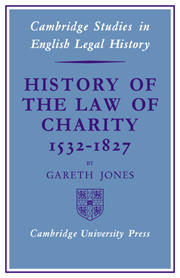Book contents
- Frontmatter
- Contents
- Preface
- List of Abbreviations
- Table Of Statutes
- Table Of Cases
- THE DEVELOPMENT OF THE LAW OF CHARITY 1532–1700
- THE DEVELOPMENT OF THE LAW OF CHARITY 1700–1827
- VI Introduction
- VII The Mortmain Act, 1736
- VIII The Preamble to the Charitable Uses Act, 1601, and the Definition of Charity
- IX The Influence of the Mortmain Act, 1736, on the Definition of Charity
- X The Development of the Law of Charity 1700–1827: The Privileges of Charity
- XI The Enforcement of Charitable Trusts 1700–1827
- Appendixes
- Index
XI - The Enforcement of Charitable Trusts 1700–1827
Published online by Cambridge University Press: 07 October 2011
- Frontmatter
- Contents
- Preface
- List of Abbreviations
- Table Of Statutes
- Table Of Cases
- THE DEVELOPMENT OF THE LAW OF CHARITY 1532–1700
- THE DEVELOPMENT OF THE LAW OF CHARITY 1700–1827
- VI Introduction
- VII The Mortmain Act, 1736
- VIII The Preamble to the Charitable Uses Act, 1601, and the Definition of Charity
- IX The Influence of the Mortmain Act, 1736, on the Definition of Charity
- X The Development of the Law of Charity 1700–1827: The Privileges of Charity
- XI The Enforcement of Charitable Trusts 1700–1827
- Appendixes
- Index
Summary
Charity commissions under the statute 43 Elizabeth I c. 4 still issued in the eighteenth century, but with each year their number became fewer. The statutory procedure was cumbersome and intolerably slow. Its demise was inevitable, and in 1787 the last commission under the statute 43 Elizabeth I c. 4 was sealed. In retrospect it is surprising that practitioners should have turned to the information as a more effective method of enforcing charitable trusts. But it might have been thought that no procedure could be as unsatisfactory as the commission and it might have been hoped that the information would not inherit any of the simple bill's defects, being injected with the authority of the Crown, acting through the Attorney-General, in whose name the information was presented:
…[T]hat the King is to be considered as the parens patriae, that he is the protector of every part of his subjects, and, that, therefore, it is the duty of his officer, the Attorney-General, to see that justice is done to every part of those subjects.
Yet the information proved to be even more tardy, costly and frustrating than the commission-procedure it supplanted, so much so that in 1818 it could be asserted ‘that it was impossible, through the Court of Chancery, to obtain redress for the abuses of charitable institutions’. The interminable delays and crushing expense to which any eighteenth-century litigant in Chancery were exposed are a matter of well known history.
- Type
- Chapter
- Information
- History of the Law of Charity, 1532-1827 , pp. 160 - 168Publisher: Cambridge University PressPrint publication year: 1969

